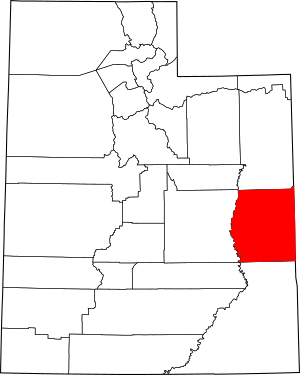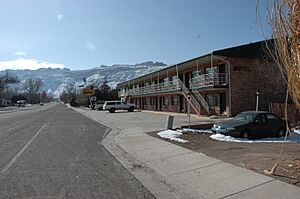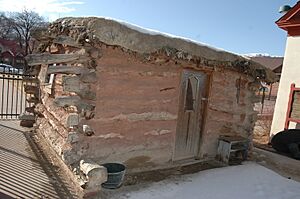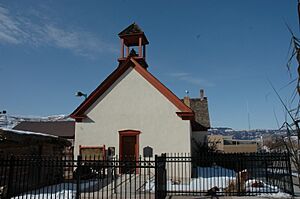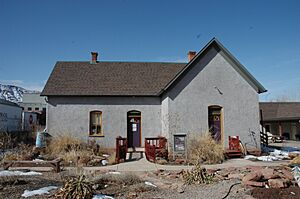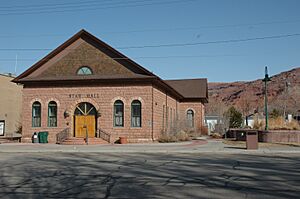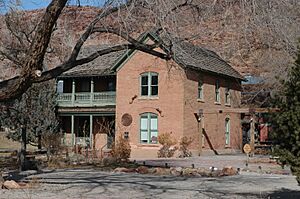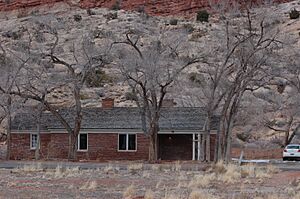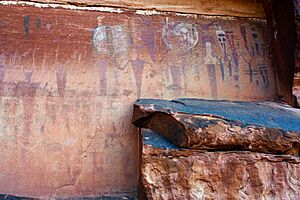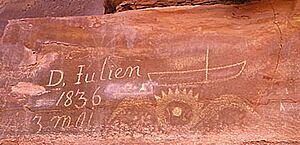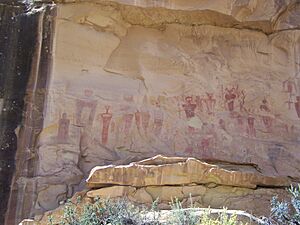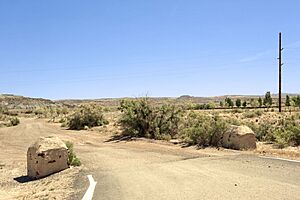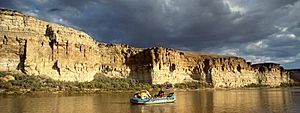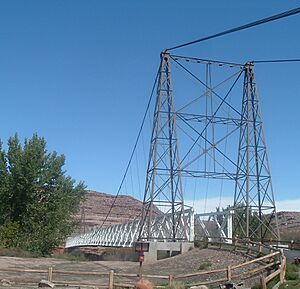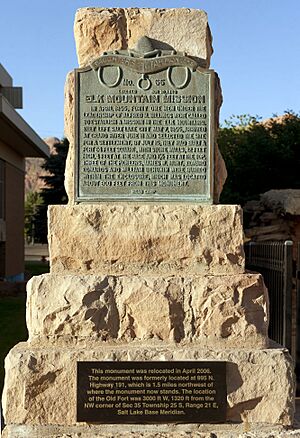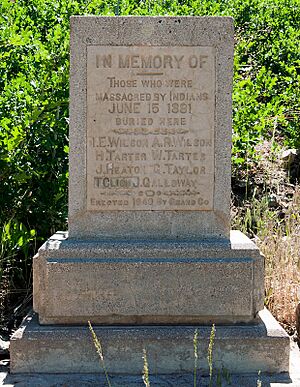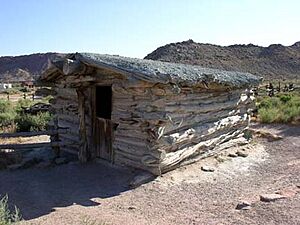National Register of Historic Places listings in Grand County, Utah facts for kids
Grand County, Utah, is home to many amazing places that are part of the National Register of Historic Places. This special list includes buildings, sites, and objects that are important to the history of the United States. When a place is on this list, it means it's worth protecting and learning about for future generations.
In Grand County, there are 23 different places on the National Register. One of these is even more special: it's a National Historic Landmark! This means it's super important to the history of the entire country. Let's explore some of these cool historic spots.
Contents
Historic Places in Grand County, Utah
Old Buildings and Homes
Grand County has several old buildings that tell stories of the past. These places show us how people lived and worked long ago.
Apache Motel
The Apache Motel is a historic motel located in Moab. It was built in 1955 and is a great example of the kind of motels that were popular when people started traveling more by car. It's found at 166 S. 400 East in Moab.
Moab Cabin
The Moab Cabin is a very old cabin in Moab, located at 56 S. 100 East. It's a simple building that shows how early settlers might have lived in the area. It was added to the National Register in 1980.
Moab LDS Church
The Moab LDS Church, located at 65 N. 200 East, is an important religious building in the community. It was built in 1925 and has been a central part of Moab for many years.
John Henry Shafer House
The John Henry Shafer House is a historic home at 530 S. 400 East in Moab. This house was built in 1904 and shows the architectural style of that time. It's a good example of early 20th-century homes in the area.
Star Hall
Star Hall, found at 159 E. Center St. in Moab, is a community building with a lot of history. It was built in 1906 and has been used for many different events over the years, from performances to town meetings.
Arthur Taylor House
The Arthur Taylor House is another historic home in Moab, located at 1266 N. U.S. Route 191. This house was built in 1896 and gives us a peek into the lives of people who lived in Moab over a hundred years ago.
Orlando W. Warner House
The Orlando W. Warner House is located at 1010 E. Millcreek Dr. in Moab. This house was built in 1890 and is one of the older homes on the list, showing the early settlement of the area.
Rock House-Custodian's Residence
This building is located near the Arches National Park Visitor Center. It was built in 1937 and served as a home for park staff. It's a good example of the early buildings constructed in national parks.
Ancient Art and Inscriptions
Grand County is famous for its amazing rock art and historic inscriptions left by early travelers. These sites give us clues about the people who lived here long ago.
Courthouse Wash Pictographs
These ancient paintings are found about 1 mile northwest of Moab in Arches National Park. Pictographs are images painted on rock walls, often by Native American people. They tell stories and show beliefs from thousands of years ago.
Julien Inscription Panel
This inscription is located near Dark Angel in Arches National Park. It's one of several inscriptions left by Denis Julien, an early fur trapper and explorer. He carved his name and dates into rocks in the early 1800s.
Denis Julien Inscription
Another inscription by Denis Julien can be found at the mouth of Hell Roaring Canyon in Canyonlands National Park. These carvings are important because they show the paths of early explorers in the American West.
Ringhoffer Inscription
The Ringhoffer Inscription is located near Tower Arch in Arches National Park. This is another example of early explorers leaving their mark on the landscape.
Robidoux Inscription
The Robidoux Inscription is on the west side of Westwater Creek, where East Canyon meets the main canyon, near Cisco. This inscription was left by Antoine Robidoux, another fur trapper and trader from the early 1800s.
Thompson Wash Rock Art District
This entire district near Thompson Springs is a special area known for its many examples of rock art. It includes both pictographs (paintings) and petroglyphs (carvings) made by ancient people. These sites are very important for understanding the history and culture of Native Americans in the region.
Important Historical Sites and Areas
These sites mark important events or pathways from the past, showing how people traveled and interacted with the land.
Dalton Wells CCC Camp-Moab Relocation Center
This site, located about 13 miles north of Moab on U.S. Route 191, has a complex history. It was first a Civilian Conservation Corps (CCC) camp in the 1930s, where young men worked on public projects during the Great Depression. Later, during World War II, it was used as a relocation center for Japanese Americans. Not much remains today except for some old pylons and cottonwood trees.
Desolation Canyon
Desolation Canyon is a huge, wild canyon along the Green River in western Grand County. It's so important that it's a National Historic Landmark! This canyon is known for its incredible natural beauty and its history as a travel route for Native Americans and early explorers. It's a rugged and remote area.
Dewey Bridge
The Dewey Bridge was a historic suspension bridge northeast of Moab on Utah State Route 128. Built in 1916, it was a famous landmark and the longest suspension bridge in Utah. Sadly, it was destroyed by fire in 2008, but its history is still remembered.
Elk Mountain Mission Fort Site
This site, northwest of Moab, marks the location of an early Mormon mission fort from 1855. It was one of the first attempts by settlers to establish a community in the Moab area.
Old Spanish Trail
The Old Spanish Trail was a historic trade route that connected Santa Fe, New Mexico, with Los Angeles, California, in the 1800s. A section of this important trail runs near the Arches National Park Visitor Center. It was used by traders, trappers, and explorers.
Pinhook Battleground
The Pinhook Battleground, located east of Moab, is the site of a conflict that occurred in 1881. It was a skirmish between local settlers and Native Americans. This site is important for understanding the complex history of settlement in the region.
Wolfe Ranch Historical District
Wolfe Ranch is located north of Moab in Arches National Park. This historic ranch was settled by John Wesley Wolfe in the late 1800s. It includes a small cabin and other structures that show what life was like for early ranchers in this rugged landscape. It's a popular spot for visitors to the park.


